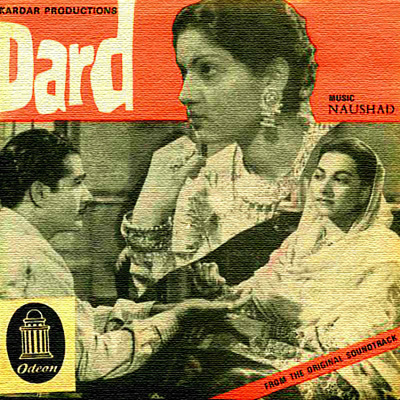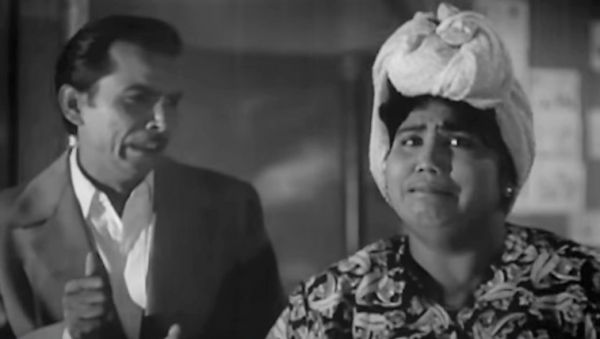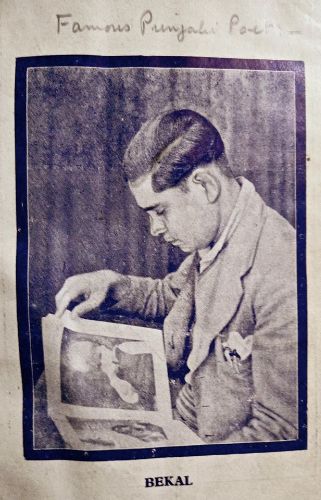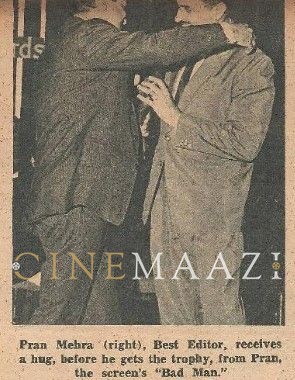‘Dil Ko Laga Ke Humne Kuchh Bhi Na Paaya’- - Uma Devi (Tuntun)
07 Apr, 2020 | Beete Hue Din by Shishir Krishna Sharma
Subscribe to read full article
This section is for paid subscribers only. Our subscription is only $37/- for one full year.
You get unlimited access to all paid section and features on the website with this subscription.
Not ready for a full subscription?
You can access this article for $2, and have it saved to your account for one year.
Her first step in the arena of Hindi cinema was as a singer. Her very first song crossed all the milestones of popularity and success. But hardly after lending her voice to 40-45 some odd songs, she had to separate from filmdom due to some household reasons. And then soon after, financial constraints pulled her back into this world of glamour and glitz. But till then the playback scenario had changed so much that it wasn't easy for her to get work as a singer. And inevitably, to earn money, she had to step in front of the camera. Such was destinies ploy! Probably she hadn't commanded such popularity as singer Uma Devi as she enjoyed as actress Tun Tun. Hindi cinema's audience of the 1950s and 60s are witness to the fact that Tuntun was perhaps the only female comedian whose mere appearance on screen would evoke the entire cinema hall into bouts of absolute laughter. Her fame preceded all others to the extent that she would be seen in every 2nd or 3rd film, it didn't matter whether her role was minuscule or was for just 1or 2 scenes. Its often said that it's not necessary that an actor's screen image or reel life has to coincide with their real life. And this is very true to a large extent. But Tuntun was an exception. She was just as jovial and merry in her personal life as she was portrayed on screen. But this was just one facet of her personality.
By the time my generation grew up, Indian cinema had almost become coloured. Despite that the black and white era of cinema had a pull on me then that bordered on obsession and it does so even today. Qualities like clean and rich films with a purpose, melodious soothing music of those films, versatile and experienced actors, talented writers-composers-singers, impeccable language and Indian-ness enveloped in simplicity make that era the golden era of Hindi Cinema. When I came to Mumbai almost 17 years ago I didn't think for even a second that this obsession would open up a whole new host of opportunities for me. My close friend and famous writer and journalist Dhirendra Asthana could clearly see a writer hidden inside of me that I wasn't even aware of. Cheering that hidden writer inside me, Dhirendraji encouraged me to write stories and other articles for magazines like Jansatta Sabrang, Jagran Sakhi and Jagran Uday and many others as and when he joined hands with them. He was also well aware of my emotional attachment with the golden era of Hindi Cinema. That's why when he became the Mumbai Bureau Chief of Sahara Samay (now ceased); he immediately handed over an entire page of the Hindi weekly to me. My writing started in a proper way with the film Quiz and column Bakalam Khud and another column called Kya Bhoolon Kya Yaad Karoon which was featured on the same page. I was always curious to know about the famous personalities of the golden era who had faded away into oblivion with time, now, I had a motive to do so and hence I immersed myself in search of those lost stars. Shyama, Shashikala, Sharda, Mahipal, Joy Mukherjee, Rajendra Nath,Anita Guha, Dulari, Purnima, Sudha Malhotra...the list of such names is in-exhaustive. Senior actor Chandrashekhar ji and Anil Ganpat Gaikwad and Sukhdev Bapu Jadhav working at Cine & T.V.Artistes Association helped me in this arduous job immensely. While Chandrashekhar ji refreshed my memory of many long-forgotten artists, Anil and Sukhdev dove into the records of the Association and kept providing me with their addresses and phone numbers. One of those actors whose whereabouts I was curious about was Tuntun. But I didn't have her correct address. If I did have the right address, I would have interviewed her at the beginning of Sahara Samay's publication. When I went to the address, listed in the Associations register, at Yari road situated in Andheri (west), I came to know that she had sold off that flat and shifted almost a year back. Nobody knew where she had gone. She hadn't even contacted the Cine & T.V.Artistes Association for a long time.
By the time my generation grew up, Indian cinema had almost become coloured. Despite that the black and white era of cinema had a pull on me then that bordered on obsession and it does so even today. Qualities like clean and rich films with a purpose, melodious soothing music of those films, versatile and experienced actors, talented writers-composers-singers, impeccable language and Indian-ness enveloped in simplicity make that era the golden era of Hindi Cinema. When I came to Mumbai almost 17 years ago I didn't think for even a second that this obsession would open up a whole new host of opportunities for me. My close friend and famous writer and journalist Dhirendra Asthana could clearly see a writer hidden inside of me that I wasn't even aware of. Cheering that hidden writer inside me, Dhirendraji encouraged me to write stories and other articles for magazines like Jansatta Sabrang, Jagran Sakhi and Jagran Uday and many others as and when he joined hands with them. He was also well aware of my emotional attachment with the golden era of Hindi Cinema. That's why when he became the Mumbai Bureau Chief of Sahara Samay (now ceased); he immediately handed over an entire page of the Hindi weekly to me. My writing started in a proper way with the film Quiz and column Bakalam Khud and another column called Kya Bhoolon Kya Yaad Karoon which was featured on the same page. I was always curious to know about the famous personalities of the golden era who had faded away into oblivion with time, now, I had a motive to do so and hence I immersed myself in search of those lost stars. Shyama, Shashikala, Sharda, Mahipal, Joy Mukherjee, Rajendra Nath,Anita Guha, Dulari, Purnima, Sudha Malhotra...the list of such names is in-exhaustive. Senior actor Chandrashekhar ji and Anil Ganpat Gaikwad and Sukhdev Bapu Jadhav working at Cine & T.V.Artistes Association helped me in this arduous job immensely. While Chandrashekhar ji refreshed my memory of many long-forgotten artists, Anil and Sukhdev dove into the records of the Association and kept providing me with their addresses and phone numbers. One of those actors whose whereabouts I was curious about was Tuntun. But I didn't have her correct address. If I did have the right address, I would have interviewed her at the beginning of Sahara Samay's publication. When I went to the address, listed in the Associations register, at Yari road situated in Andheri (west), I came to know that she had sold off that flat and shifted almost a year back. Nobody knew where she had gone. She hadn't even contacted the Cine & T.V.Artistes Association for a long time.
"It was Naushad Saheb who gave me the name Tuntun in place of Uma Devi in the film Babul. And with time this name became my identity. The audience adored me in this form and I became one of the busiest female comedians."
After almost 4-5 months, Anil suddenly rang me. In a very excited tone, Anil told me that Tuntunji had called him, now she stays at Bandra (west)'s Pali Village with her younger daughter and she has promised to be a part of the soon to be held annual general body meeting of the association. I reached the meeting on time. When I saw the slim trim and elderly Tuntun sitting on stage in front of me, her screen image which was still engraved in my mind was shattered to pieces. I could see big stars like Dilip Kumar, Chandrashekhar ji, Dharmendra, Amrish Puri and Dara Singh regarding her with a lot of respect. Despite having gained many years there was no shortage of the same spark, enthusiasm and quick retort. While I was introducing myself I expressed my desire to interview her and she readily agreed. As per my appointment on 27th October, 2003, at 6:00 in the evening I reached Tuntuns home in Pali village along with my photographer colleague Anil Murarka. A carefree attitude, catchy phrases, laughter at every anecdote, these might be her much-celebrated facets of personality but in reality, there is a lot of pain hiding behind her jovial attitude. She has hardly experienced any happiness in her life. This was a recorded interview that I have kept safely to date. So here it is, Tuntun's story, in her own words -

“I don't remember who my parents were or what they looked like. I was around 2 – 2 ½ years old when they passed away. I had a brother who was 8-9 years elder to me and his name was Hari. I just remember that we used to stay in a village called Alipur. There was a lake in the middle of the village where ducks used to swim. My brother used to participate in the Ramleela held in the village. One day I was sitting on the roof of someone's house watching the Ramleela when I fell asleep and subsequently rolled off the roof. My brother used to take such good care of me that when I fell he left the Ramleela stage in between and ran to pick me up. At that time I was around 3-4 years old and my brother was around 12-13 years old. But one day he passed away as well and left me to fend for myself as a full-time servant for my relatives. Now amongst my relatives whenever there was a function like marriage or death, I would be sent there to work. I suspect that Alipur is maybe somewhere near Delhi because I would often travel to and fro from some relatives' house in Delhi's Daryaganj area. Then one day I came to know through my neighbours that we had a lot of land in Alipur and to obtain that land my parents and then my brother was murdered.
I was fond of singing since an early age but I used to be scared of even humming a tune as if any of those people would hear me singing then I would be beaten up. In those days in Delhi, I met excise departments inspector Akhtar Abbas Kazi. With his support, my self-confidence started rising. But then the partition took place and Kazi Saheb went to Lahore. Tired of my situation, I quietly ran away to Mumbai with the dream of becoming a singer. Someone in Delhi had given me director Nitin Bose's assistant Javvad Hussain's address and so I went to meet him and he gave me shelter. I was around 14 years old at that time. There Kazi Saheb found it difficult to adjust in Lahore and so as soon as he got a chance he came to Mumbai and then we got married. This happened in 1947.
"Finally, I sang Noorjehan's song Andhiyaan gham ki yoon chaleen from the film Zeenat (1945) and everyone liked it so much that they immediately kept me on a salary of 500 rupees per month."
I was in search of work. Kardar was making film Dard those days. One day I went to his studio and uninterrupted I entered his office and without any hesitation, I ended up asking him, where can I meet Kardar, I want to sing songs. Actually I didn't know what Kardar looked like and I wasn't even familiar with the ways of the film industry. Maybe Kardar liked my informal attitude and that's why without any delay he called on Naushad Saheb's assistant Ghulam Mohammad and asked him to take my test. Ghulam Mohammad sat with the dholak and I told him to play it properly. He was stunned with my undaunted attitude. Finally, I sang Noorjehan's song Andhiyaan gham ki yoon chaleen from the film Zeenat (1945) and everyone liked it so much that they immediately kept me on a salary of 500 rupees per month.
The first song to be recorded in my voice was Afsana likh rahi hoon dile beqaraar ka of the 1947 film Dard. This song became so popular that till date I am recognized by that song. The rest of the three songs sung by me for this film, Aaj machi hai dhoom, ye kaun chala and betaab hai dil sung with Suraiya were also received quite well. I also sung Dil waale jal kar hi marr jaana for the film Natak made in the same year. I sang two solo songs for the 1948 film Anokhi Ada which were Kaahe jiya dile ho kaha nahin jaaye and Dil ko laga ke humne kuchh bhi na paaya. I also got the opportunity to sing the title song Chandni raat hai haaye kya baat hai of the film 1948 released film Chandni Raat. Made in the same year, I sang a song meri Pyari patang chali baadal ke sang along with Shamshad Begum for the film Dulari. The music director for all these film was Naushad Saheb. I also sang songs for films like Chandralekha, Heer Ranjha (both 1948), Bhikhari, Bhakt Pundalik, Pyar Ki Raat, Sumitra, Rooplekha, Jiyo Raja, Hamari Kismat (all 1949), Bhagwan Shri Krishna (1950), Saudamini (1950), Deepak (1951), Jungle Ka Jawahar (1952) and Rajmahal (1953). Because I had no formal training in music and singing and with my growing children my household responsibilities were also growing that's why my singing career didn't last for too long. In total I sang approximately 45 songs. I want to clear here that many say that I was given sindoor to eat and hence my voice got spoilt, this is nothing but a rumour. This statement has no truth in it.
For some time I stayed away from films engrossed in my family. My husband used to work but as our family grew his salary proved to be not enough for us and hence once again I had to step out in search of work. I met Naushad Saheb who was making the film Babul at that time. He asked me to do a comedy role in his movie and I accepted it. Although he had offered me a role in the film Dard as well at that time I wasn't mentally prepared than to do so. It was Naushad Saheb who gave me the name Tuntun in place of Uma Devi in the film Babul. And with time this name became my identity. The audience adored me in this form and I became one of the busiest female comedians. And then I did a dozen films like Udan Khatola (1955), Baaz (1953), Aar Paar (1954), Miss Coca Cola (1955), Mr.& Mrs. 55 (1955), Raj Hath (1956), Begunaah (1957), Ujala (1959),Kohinoor (1960), Naya Andaz (1956), 12 O'Clock (1958), Dil Apna Aur Preet Parai (1960), Kabhi Andhera Kabhi UjalaKabhi Andhera Kabhi Ujala (1960), Mujrim (1958), Jaali Note (1960), Ek Phool Char Kante (1960), Kashmir Ki Kali (1964), Akalmand (1966), C.I.D. 909 (1967), Dil Aur Mohabbat (1968), Ek Bar Mooskura Do and Andaaz (1971). Around the 1970s my demand started decreasing and then after films like Qurbani (1980) and Namak Halaal (1982) I distanced myself from this performing art. Kazi Saheb passed away in the beginning of 1990s. Now having fulfilled all my duties towards both my sons and both my daughters, since the last 20 years I stay at home and rest.

Published on 22 November 2003 in Sahara Samay, this proved to be Tuntuns last interview. I told her that I am sending a copy of the paper through the courier. Commenting on this in her own unique style she said, “You are sending the magazine via courier then you should have taken the interview via the phone”. After almost half an hour she kept the phone only after I promised her that I would come to meet her very soon. But alas, I couldn't keep my promise to her. She couldn't even read her last interview because the next morning her health failed her; she was admitted to a private hospital in Bandra where she left her body in the morning at 5:00 am on 24th November, 2003.
Its been almost 9 years since Tuntun left us. But whenever people will talk of Hindi Cinema's female comedians, her name, will always be on the top of the list.
(Part of Shishir Krishna Sharma's Beete Hue Din blog series)
204 views







.jpg)


